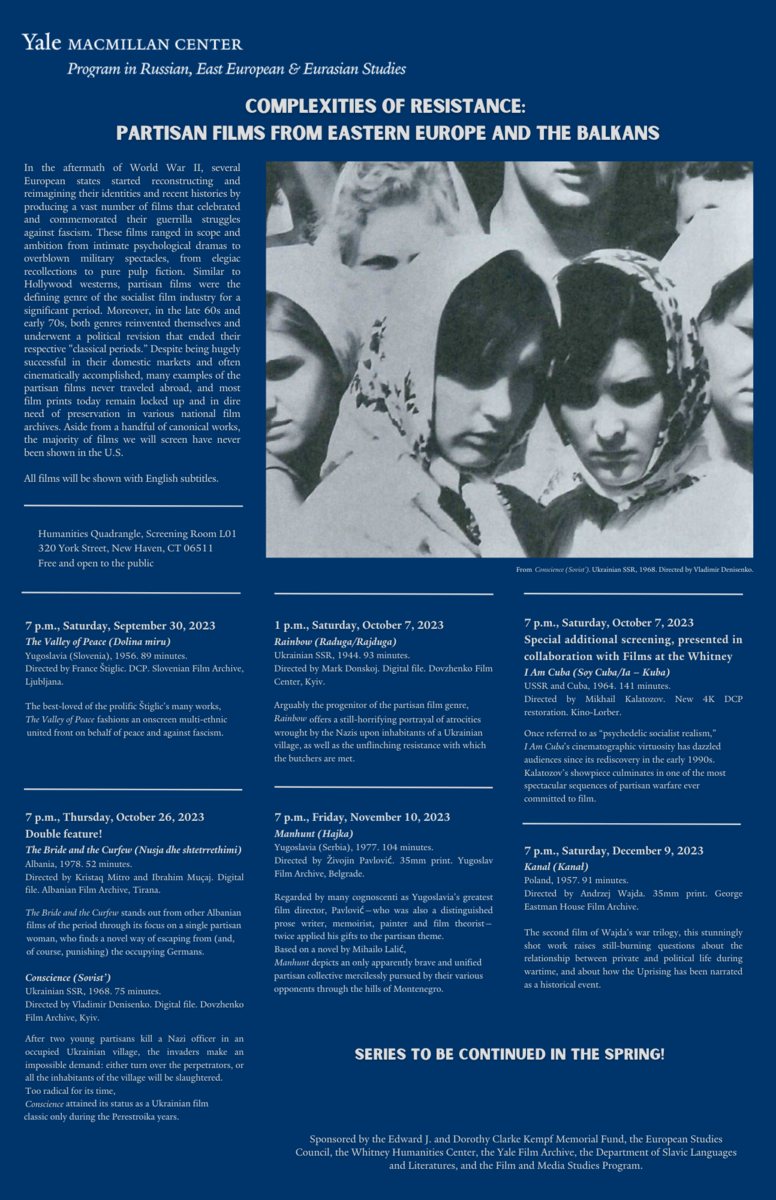Complexities of Resistance: Partisan Films from Eastern Europe and the Balkans
In the aftermath of World War II, several European states started reconstructing and reimagining their identities and recent histories by producing a vast number of films that celebrated and commemorated their guerrilla struggles against fascism. These films ranged in scope and ambition from intimate psychological dramas to overblown military spectacles, from elegiac recollections to pure pulp fiction.
Similar in certain ways to Hollywood westerns, partisan films were the defining genre of the socialist film industry for a significant period. Moreover, in the late 60s and early 70s, both genres reinvented themselves and underwent a political revision that ended their respective “classical periods.” Despite being hugely successful in their domestic markets and often cinematically accomplished, many examples of the partisan films never traveled abroad, and most film prints today remain locked up and in dire need of preservation in various national film archives. Aside from a handful of canonical works, the majority of films we will screen have never been shown in the U.S.
The series is free and open to the public. All films will be shown with English subtitles in HQ (Humanities Quadrangle, 320 York Street) L01.
Saturday, September 30, 7 pm
The Valley of Peace (Dolina miru). Yugoslavia (Slovenia), 1956. 89 minutes. Directed by France Štiglic. DCP. Slovenian Film Archive, Ljubljana.
The best-loved of the prolific Štiglic’s many works, The Valley of Peace fashions an onscreen multi-ethnic united front on behalf of peace and against fascism.
Saturday, October 7, 1 pm
Rainbow (Raduga/Rajduga) Ukrainian SSR, 1944. 93 minutes. Directed by Mark Donskoj. Digital file. Dovzhenko Film Center, Kyiv.
Arguably the progenitor of the partisan film genre, Rainbow offers a still-horrifying portrayal of atrocities wrought by the Nazis upon inhabitants of a Ukrainian village, as well as the unflinching resistance with which the butchers are met.
Special additional screening, presented in collaboration with Films at the Whitney
Saturday, October 7, 7 pm
I Am Cuba (Soy Cuba/Ia – Kuba). USSR and Cuba, 1964. 141 minutes. Directed by Mikhail Kalatozov. New 4K DCP restoration. Kino-Lorber.
Once referred to as “psychedelic socialist realism,” I Am Cuba’s cinematographic virtuosity has dazzled audiences since its rediscovery in the early 1990s. Kalatozov’s showpiece culminates in one of the most spectacular sequences of partisan warfare ever committed to film.
Thursday, October 26, 7 pm. Double feature!
The Bride and the Curfew (Nusja dhe shtetrrethimi). Albania, 1978. 52 minutes. Directed by Kristaq Mitro and Ibrahim Muçaj. Digital file. Albanian Film Archive, Tirana.
The Bride and the Curfew stands out from other Albanian films of the period through its focus on a single partisan woman, who finds a novel way of escaping from (and, of course, punishing) the occupying Germans.
Conscience (Sovist’). Ukrainian SSR, 1968. 75 minutes. Directed by Vladimir Denisenko. Digital file. Dovzhenko Film Archive, Kyiv.
After two young partisans kill a Nazi officer in an occupied Ukrainian village, the invaders make an impossible demand: either turn over the perpetrators, or all the inhabitants of the village will be slaughtered. Too radical for its time, Conscience attained its status as a Ukrainian film classic only during the Perestroika years.
Friday, November 10, 7 pm
Manhunt (Hajka). Yugoslavia (Serbia), 1977. 104 minutes. Directed by Živojin Pavlović. 35mm print. Yugoslav Film Archive, Belgrade.
Regarded by many cognoscenti as Yugoslavia’s greatest film director, Pavlović—who was also a distinguished prose writer, memoirist, painter, and film theorist—twice applied his gifts to the partisan theme. Manhunt depicts an only apparently brave and unified partisan collective mercilessly pursued by their various opponents through the hills of Montenegro.
Saturday, December 9, 7 pm
Kanal (Kanał). Poland, 1957. 91 minutes. Directed by Andrzej Wajda. 35mm print. George Eastman House Film Archive.
The second film (following A Generation (1955) and Ashes and Diamonds (1958)) of Wajda’s war trilogy, this stunningly shot work raises still-burning questions about the relationship between private and political life during wartime, and about how the Uprising has been narrated as a historical event.
Series to be continued in the spring!
Sponsored by the Edward J. and Dorothy Clarke Kempf Memorial Fund, the European Studies Council, the Whitney Humanities Center, the Yale Film Archive, the Department of Slavic Languages and Literatures, and the Film and Media Studies Program.
